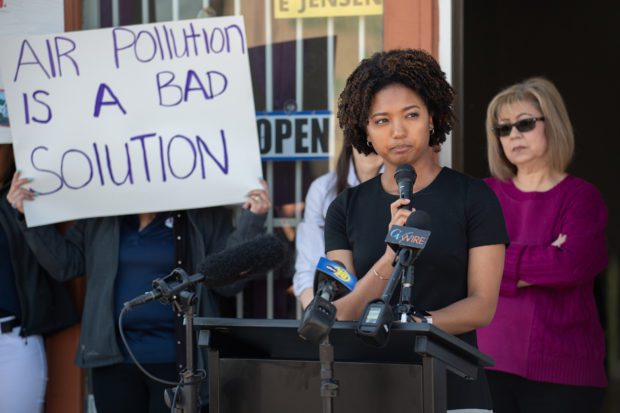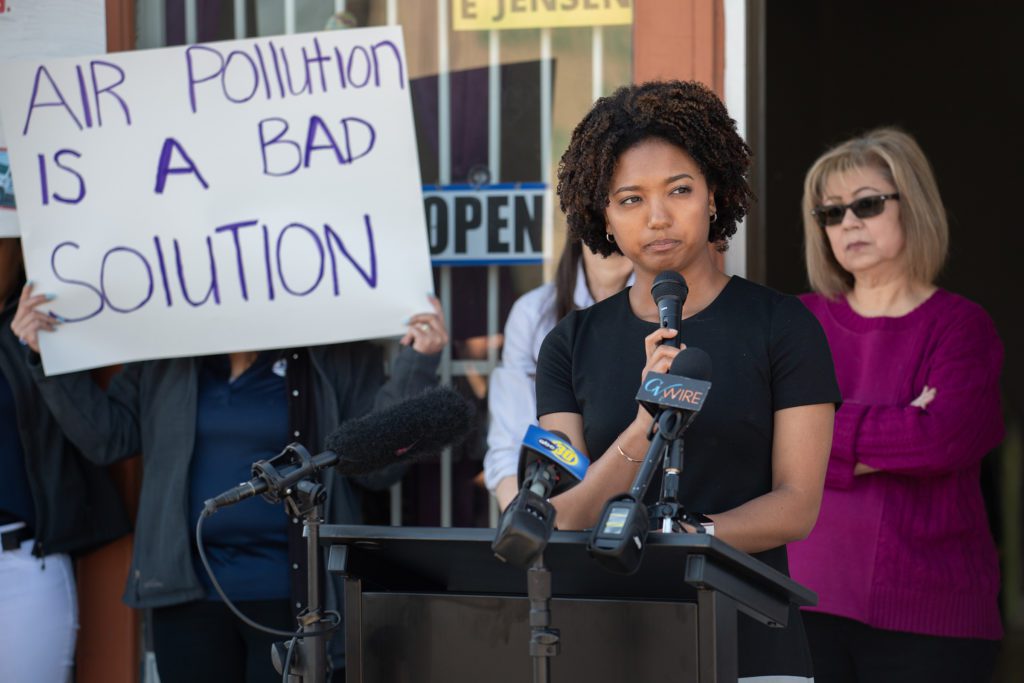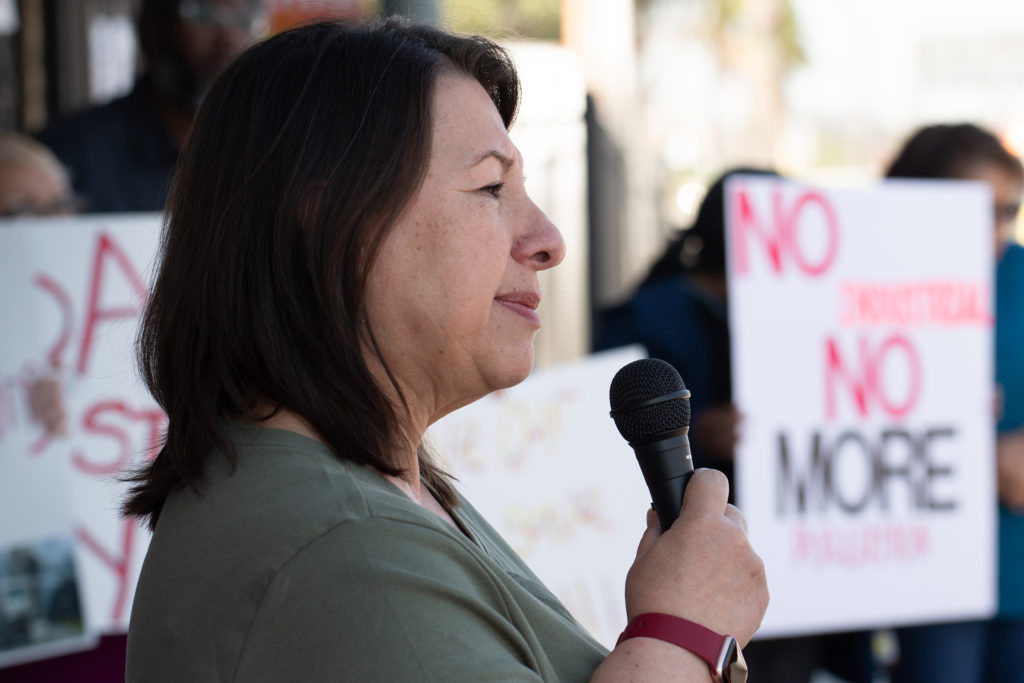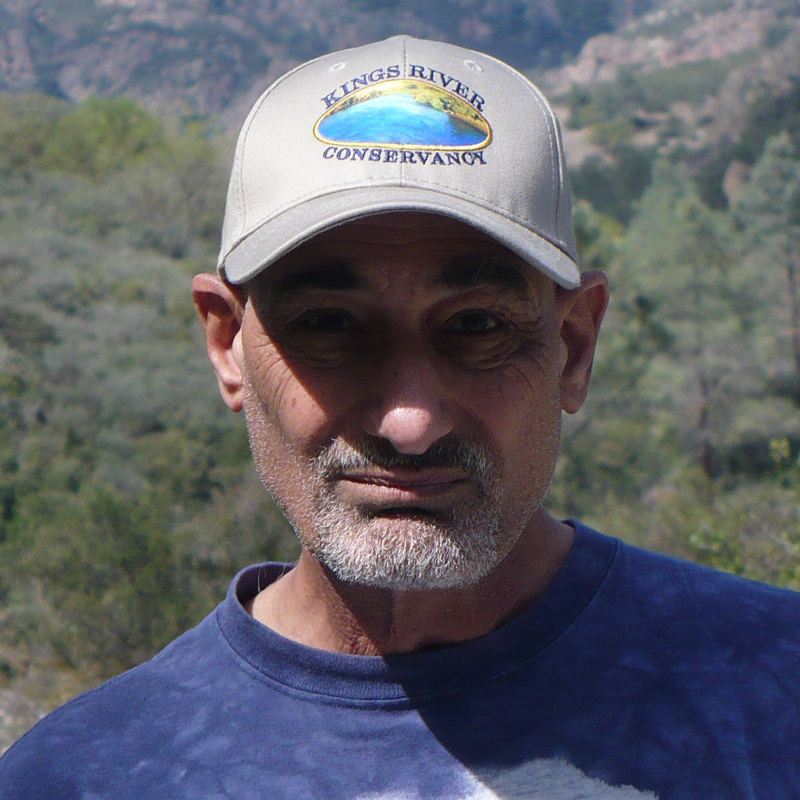

Residents of south Fresno have been inundated with massive industrial development in recent years. Now, community groups are suing the California Department of Transportation and the Federal Highway Administration over the expansion of two freeway interchanges on Highway 99. They say the project will promote even more development and intensify environmental hazards for communities already burdened with some of the worst air quality in the state.
Amid the roar and rumble of 18-wheelers and construction equipment, two local civic organizations rallied residents last month to support their lawsuit against Caltrans and the Federal Highway Administration. In the works is the construction of two major interchanges that would bring more trucks, more toxic air and more noise to an area already enveloped by warehouses and industries.
Edith Rico represented one of the litigants, Fresno Building Healthy Communities. “Residents in Calwa, Malaga and other communities have a message for Caltrans. You cannot use our communities as a toxic dumping ground for polluting industries.
“We are calling on Caltrans and the State of California to match their words with action. Stop polluting our neighborhoods and start investing in what residents want and need to thrive.”
Fresno residents are being assisted legally by Stanford University’s Environmental Law Clinic. Jacqueline Maldonado, a student there, says the highway project is part of a long history of discriminatory land-use and transportation practices, which have concentrated pollution in the low-income communities of Calwa and Malaga.
When State Route 99 was converted into a freeway here in the 1950s, it destroyed more than 20 blocks of housing and divided communities of color. Maldonado says that the current project shows the same aversion to environmental laws that protect the health and safety of local residents.
“The agencies have violated these laws in numerous respects,” says Maldonado. “They fail to consider increases in traffic and industrialization that the project will cause for the related air quality, odor, noise, public health and environmental impacts.
“They refuse even to recognize the existence of thousands of residents living near the interchanges or to consider the possibility that residents will be harmed.”
The explosive growth of warehouses up and down the San Joaquin Valley is also contributing to important drivers of climate change—rising greenhouse gas emissions and loss of biological diversity. Both of those factors are at play in the industrialization of south Fresno.

Panfilo Cerrillo has lived here all his life. Growing up, he walked to school and rode his bike around the neighborhood. He’s witnessed the changes, slowly at first and now accelerated, regretting that his grandkids can’t do those things anymore.
“When I grew up out there, you could hear all the wildlife. You could see the wildlife. You could open up your front door and see the pheasants running away from the quail with all their little chicks running off.
“You know, it’s been about 10 or 12 years since I saw any of that. We used to see kit foxes out there. Those are now gone. And it’s all because of this development.”
Last summer, Attorney General Rob Bonta held a meeting in Calwa assuring residents of frontline communities that he would fight for them. “We care deeply about environmental justice,” he said, “making sure that every person in every community, regardless of your zip code, your income, your race, your ethnicity, that you have access to clean water and clean air and a healthy and safe environment.”
Local activists expressed disappointment that Bonta has yet to weigh in on the projects bringing freeway expansion and more industrial development to their communities.
Caltrans and the Federal Highway Administration prepared an environmental review of the project but concluded that there was no significant impact on the environment of the communities and declined to create a full environmental impact statement.
Stanford Environmental Law Clinic’s Stephanie Safdi explained the discrepancy in that analysis. “That discrepancy goes to the general issue here, which is that Caltrans and the Federal Highway Administration had to do a detailed environmental review of all of the impacts of this project on the environment.
“Public health and community welfare and their review, in many respects, fell short. They didn’t consider traffic increases. They didn’t fully consider the air quality impact. They didn’t consider impacts on environmental justice communities.
“And the discrepancy between how they proceeded under the state and federal laws just showcases how much their review came up short.”
It’s not just the construction and expansion of two highway interchanges that has local residents worried. It’s also the plan for a new 3,000-acre industrial park nearby.
But Caltrans and the Federal Highway Administration decided the combined impact of all that would not result in any “meaningful pollution.” Since then, the federal Environmental Protection Agency has weighed in, requesting that the state and federal highway agencies reevaluate their conclusion.
Laura Moreno heads Friends of Calwa, the other group suing the highway agencies. More industrial development, she emphasizes, does not provide the kind of infrastructure that at-risk communities such as Calwa and Malaga are crying out for.
“Give the community what they need on roads and lower-income housing,” says Moreno. “Friends of Calwa is reaching out to Caltrans to realize what we need, not what they want to give us.”
Caltrans has an equity policy that promises to engage local residents in development projects it proposes. Here, in part, are some of those pledges:
We will create a workforce at all levels that is representative of the communities we serve.
We will meaningfully engage communities most impacted by structural racism in the creation and implementation of the programs and projects that impact their daily lives by creating more transparent, inclusive, and ongoing consultation and collaboration processes.
We commit to combating the climate crisis and its disproportionate impact on frontline and vulnerable communities.
We will change how we plan, design, build and maintain our transportation investments to create a more resilient system that more equitably distributes the benefits and burdens to the current and future generations of Californians.
South Fresno residents are sending a message with this lawsuit that they are tired of waiting for those promises to be fulfilled. They will now rely on the courts to bridge the gap between what the state promises and what it delivers.

